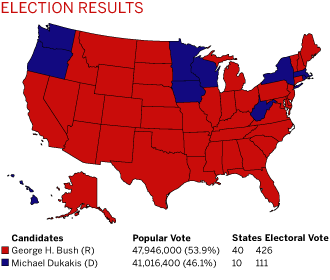1988 Bush VS. Dukakis
"Willie Horton"
Transcript
The Living Room Candidate
"Willie Horton," National Security PAC, 1988
MALE NARRATOR [and TEXT]: Bush and Dukakis on crime.
[TEXT: Supports Death Penalty]
MALE NARRATOR: Bush supports the death penalty for first degree murderers.
[TEXT: Opposes Death Penalty]
MALE NARRATOR: Dukakis not only opposes the death penalty...
[TEXT: Allowed Murderers to Have Weekend Passes]
MALE NARRATOR: ...he allowed first degree murderers to have weekend passes from prison. One was Willie Horton...
[TEXT: Willie Horton]
MALE NARRATOR:...who murdered a boy in a robbery, stabbing him 19 times. Despite a life sentence...
MALE NARRATOR [and TEXT]: Horton received 10 weekend passes from prison.
MALE NARRATOR: Horton fled, kidnapped a young couple, stabbing the man and repeatedly raping his girlfriend.
[TEXT: Kidnapping. Stabbing. Raping.]
MALE NARRATOR [and TEXT]: Weekend prison passes. Dukakis on crime.
Credits
"Willie Horton," National Security PAC, 1988
From Museum of the Moving Image, The Living Room Candidate: Presidential Campaign Commercials 1952-2012.
www.livingroomcandidate.org/commercials/1988/willie-horton (accessed February 16, 2026).
Save
| 1988 | Bush | Results |
Ronald Reagan—the first president since Eisenhower to serve two full terms—had presided over a renewed national optimism, but there were dark clouds on the horizon as his presidency drew to a close. The federal deficit was soaring out of control. The revelation that profits from American sales of weapons to Iran were illegally routed to the Nicaraguan contras spawned a major scandal. Wall Street was in turmoil following several insider-trading scandals and the October 1987 stock market collapse. The stage was set for one of the most bitter presidential campaigns in recent history: Vice President George Bush, who portrayed himself as the rightful heir to the Reagan revolution, versus Massachusetts Governor Michael Dukakis, who offered a traditionally Democratic vision of increased government spending on health care, child care, education, and housing. The Bush campaign used brutal television advertising to portray Dukakis as an ineffective liberal who would gut the country’s defense system and let convicted murderers out of prison. Hoping voters would dismiss the attacks as unfair, Dukakis refused to counterattack until late in the campaign. By then it was too late.
Dan Quayle for vice president
"Experienced Leadership for America’s Future"
The case of Willie Horton--an African American convicted murderer who raped a white woman and tortured her fiancé while on a weekend furlough from a Massachusetts prison--was frequently mentioned by George Bush in campaign speeches. The case was directly referred to in a
Though Bush’s negative commercials garnered most of the attention, his campaign also produced a series of strong positive ads, such as
Bush’s media campaign skillfully supplemented paid publicity (commercials) with free publicity in the form of staged photo opportunities sure to be reported as news--a technique originated by the 1984 Reagan campaign. For example, news footage of Bush receiving the endorsement of the Boston police union reinforced the law-and-order message of the furlough ads. The Bush media campaign was a model of control, supervised in all respects by veteran media consultant Roger Ailes, who also coached Bush for the debates.






